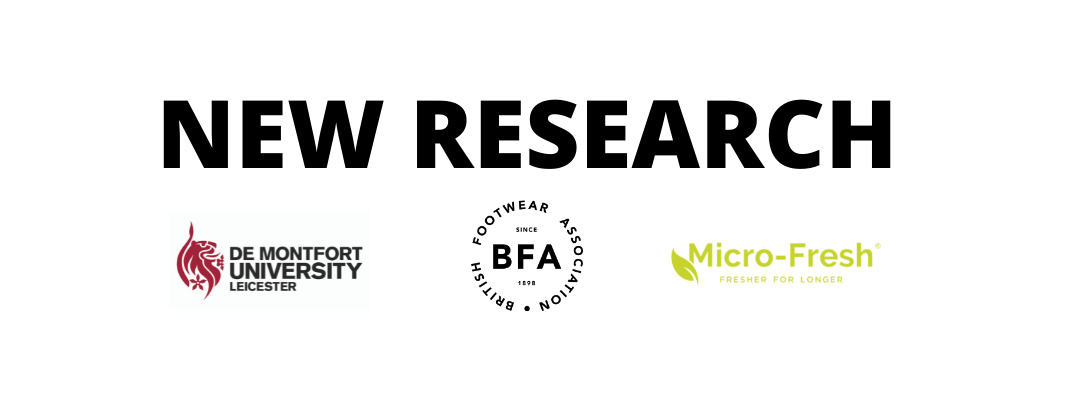Coronavirus on leather study
22nd June 2021
NEW RESEARCH TO HELP SHOE INDUSTRY RECOVER FROM PANDEMIC
Microbiologists find coronavirus can remain on shoe leather for up to two days.
The anti-viral treatment inactivates coronavirus after two hours.
Study will help industry keep workers and shoe shops safe.
De Montfort University (DMU) and the British Footwear Association (BFA) tested samples of the most popular leather used in shoe-making with Micro-Fresh® treatment and without to see how long covid-19 survived on leather.
This included the following types of leather: calf, cow, goat and sheep finished as full grain, aniline, corrected grain, semi-aniline and nubuck/suede.
The team was led by DMU microbiologist Dr Katie Laird, Head of the Infectious Disease Research Group, and virologist Dr Maitreyi Shivkumar.
This study used a human coronavirus OC43, which the team has previously shown to have a similar survival pattern to that of SARS-CoV-2, the virus that causes Covid-19. The study is published here.
The independently funded study found that Covid-19 is able to survive on leather for 24 hours and that it was able to be transmitted to shoe boxes and surfaces during the manufacturing process.
The Micro-Fresh® treatment destroys the virus, taking the survival rate down from 24-48 hours to 2 hours.
There was also no transmission from the anti-viral coated leathers to other surfaces two hours after contamination of the leathers.

They looked at how the virus reacted with different types of shoe leather and cross-contamination to surfaces such as stainless steel (used in sewing machines) and cardboard, to assess transfer from shoes in a shoe box.
The traditional shoe-making process involves many different stages. Staff were concerned at the possibility of transmitting infection through handling, how long the virus could remain on the material and throughout the manufacturing process.
They also wanted to know how long it stayed on finished shoes when they were sent to the shops to give more confidence to shoppers wanting to try on shoes.
These findings mean that shoe manufacturers now have the information to alter their health and safety procedures knowing when transmission times are highest and can advise stockists on protecting the shoes in stores.
Further conversations were held between the university and the BFA, bringing in Professor Katie Laird, who had already begun examining how Covid-19 strains behaved on three fabrics commonly used in the healthcare industry and demonstrated they were able to survive for up to 72 hours.
They discovered traces could remain infectious for up to three days. Investigating the way in which the virus behaves on leather is an extension of that work. A research paper is currently under peer review ahead of publication.
QUOTES
“This independently funded study has allowed us to understand for the first time the way in which the human coronavirus behaves on leather.
Our findings have huge potential to help the shoe industry around the world.”
- Dr Katie Laird, ASSOCIATE PROFESSOR at DMU
“Our journey began as a simple formulation to prevent the growth of mould on leather goods.
After working with Leather for over 20 years, this is a great development and a pivotal point for Micro-Fresh®, especially during the current climate.”
- Byron Dixon, FOUNDER & CEO at MICRO-FRESH®
"I am pleased that this study has found some concrete information for the footwear industry, that can now be transformed into actionable guidance to boost consumer confidence and give customers greater peace of mind, whether they are browsing, trying on or taking their goods home.
Similarly, the findings are vitally important for manufacturers across the BFA network, and I hope to see businesses critically assessing their processes to see if any improvements can be made.
Armed with this information, we can all contribute towards making the footwear sector more resilient and better able to counteract the influence of COVID-19."
- Lucy Reece Raybould, CHEIF EXECUTIVE at BRITISH FOOTWEAR ASSOCIATION
“This is a superb example of solutions-based research.
We were able to connect not only the British Footwear Association with Professor Laird, but bring in Micro-Fresh® to develop an approach that has the potential to have real and lasting impact on the industry.”
- Helen Donnellan, DIRECTOR OF ENTERPRISE & BUSINESS SERVICES at DMU
Share this post:




